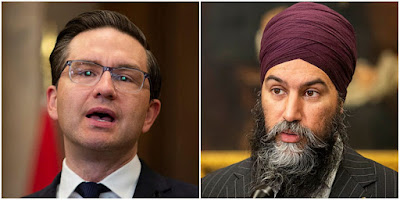On Monday, Olivia Chow was elected mayor of Toronto. Max Fawcett writes:
Chow is taking the reins of a city that’s in much worse shape than it was when she unsuccessfully ran for mayor the first time in 2014. The housing market is actively hostile to anyone who didn’t buy their home a decade or more ago, and the rising cost of shelter is pushing more people towards the margins — and, often, beyond them. The transit system suffers from chronically low ridership, which is a function of both post-COVID work patterns and growing safety concerns spurred by a series of random violent encounters. Crucial new infrastructure projects like the Eglinton LRT line seem to drag on forever, while traffic and congestion just keep going from bad to worse.
She’ll also have to find ways to fill a $1-billion hole in Toronto’s budget and the Ford government isn’t about to help her with that any time soon. Despite promising not to get involved in the mayoral election, Premier Doug Ford ended the campaign by endorsing former police chief Mark Saunders and lashing out against Chow. “If you want my opinion, if Olivia Chow gets in, it’ll be an unmitigated disaster,” he said. “Businesses are going to be fleeing Toronto as far as I'm concerned.”
After her election, Ford was less harsh,
suggesting he was willing to “work with anyone ready to work with our government... Together, let’s focus on building a strong Toronto for generations to come.” But given their differing perspectives on what actually constitutes a “strong Toronto,” you can bet that conflict between Chow and Ford will be one of the hallmarks of the next three years. The fate and future of Ontario Place, and the Ford government’s plans for a large luxury spa there, promises to be the first of many battles.
Chow's biggest problem will be housing:
Like almost every elected official in Canada’s cities right now, Chow’s biggest challenge will be getting a handle on the housing market. Her plans include the creation of 25,000 new rental homes on city-owned land, raising the city’s Vacant Homes Tax from one per cent to three per cent, and increasing the Municipal Land Transfer Tax on luxury homes worth more than $3 million. All the funding generated by these tax increases will go towards affordable housing measures.
Chow has also said she’ll raise property taxes, although she’s yet to indicate exactly how much that will be. This is an unpopular but entirely necessary measure, one that even finds backing (however reluctant) in the pages of the National Post. As Kelly McParland noted, “Since amalgamation created today’s Toronto 25 years ago, a series of mayors has refused to ask homeowners to pay the full cost of the services they demand. Ontario’s biggest and priciest city also has its lowest property taxes. All those multimillion-dollar downtown homes get off cheaper than any of the neighbouring suburbs, or towns and cities beyond.”
So Chow and this generation of Torontonians have been left to pick up the tab. Jack Layton's widow heralds a change:
This will mark a clear break with the last 14 years, where conservative mayors and councils slowly deprived the city of its financial oxygen, whether through artificially low property tax rates or other forms of economic stricture. Services have been cut or allowed to deteriorate in quality, infrastructure was allowed to crumble (hello, Gardiner Expressway), and the primacy of car culture went mostly unchallenged, despite all the furor from the right around the city’s small number of bike lanes.
Chow won't be able to fix everything in three years. But, clearly, Torontonians don't want more of the same.
Image: The Toronto Star










